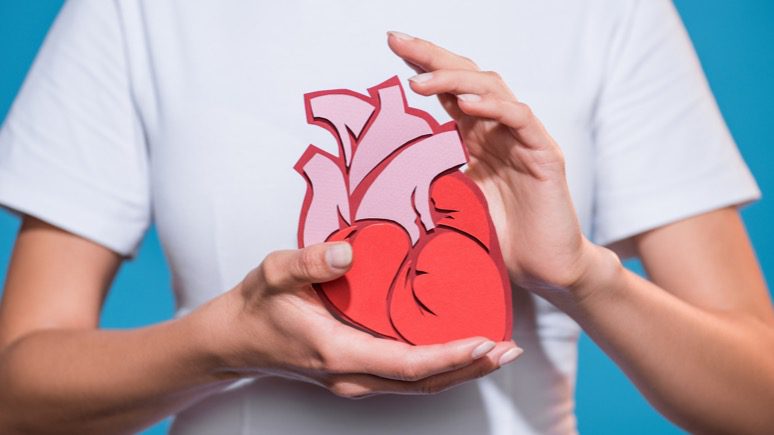Cardiomyopathy is a condition affecting the myocardium (heart muscle) that makes it harder for the heart to pump blood around the body. This disease can cause stiffness and enlargement of your heart. Cardiomyopathy can result in heart failure.
Types of cardiomyopathy
- Dilated cardiomyopathy. It is a condition when the blood-pumping chambers in the heart are enlarged (dilated).
- Restrictive cardiomyopathy. It is a condition when the heart muscle scars, stiffens, or both.
- Hypertrophic cardiomyopathy. It is a condition when your heart muscle becomes thickened.
- Stress-induced cardiomyopathy. It is a temporary heart enlargement.
- Arrhythmogenic right ventricular dysplasia (ARVD). It is a disease that causes irregular heart rhythms.
- Chemotherapy-induced cardiomyopathy. It is heart damage caused by cancer treatment.
- Peripartum cardiomyopathy. It is a congestive heart failure occurring during or after pregnancy.
- Transthyretin amyloid cardiomyopathy (ATTR-CM). It is an abnormal protein buildup in the left ventricle of the heart.
Cardiomyopathy causes
It is often unclear what causes cardiomyopathy. However, in some cases, cardiomyopathy may be inherited or result from another condition (acquired).
A number of health conditions or behaviors can lead to acquired cardiomyopathy, including:
- Heart tissue damage from a heart attack
- Heart valve problems
- Long-term high blood pressure
- Certain infections, especially those that cause inflammation of the heart
- Pregnancy complications
- COVID-19 infection
- Long-term rapid heart rate
- Iron buildup in your heart muscle (hemochromatosis)
- Taking some chemotherapy medications and radiation for cancer treatment
- Connective tissue disorders and other autoimmune diseases
- Your diet is deficient in the essential vitamins and minerals
- Drinking too much alcohol over many years
- Metabolic disorders, such as thyroid disease, obesity, or diabetes
- The growth of tiny lumps of inflammatory cells (granulomas) in any part of your body, including your heart and lungs (sarcoidosis)
- Use of cocaine, amphetamines, or anabolic steroids
- Abnormal proteins buildup in the organs
- Family history of cardiomyopathy, heart failure, or sudden cardiac arrest.
Cardiomyopathy symptoms
The early stages of cardiomyopathy are usually asymptomatic. However, as the disorder progresses, several signs and symptoms may appear, including:
- You feel breathless when active or even at rest
- Fatigue
- Swelling (edema) of the legs, ankles, and feet
- The feeling of discomfort or pressure in your chest
- Cough while lying down
- An abdominal bloating due to fluid buildup
- Dizziness, lightheadedness, and fainting
- Heart palpitations (rapid heartbeat)
- Difficulty lying flat to sleep
Cardiomyopathy symptoms and signs typically get worse unless the disorder is treated.
Cardiomyopathy treatment
Cardiomyopathy treatment aims to manage the symptoms of the condition, reduce the risk of complications, and prevent the worsening of your condition.
Medications for cardiomyopathy treatment
Cardiomyopathy can be treated by a range of different heart medications used to ease symptoms or treat underlying conditions. Such medications may help improve blood flow and the ability of the heart to pump blood, decrease blood pressure, remove excess fluid from the body, prevent blood clots, and slow the heart rate.
Therapies for cardiomyopathy treatment
- Radiofrequency ablation. In this procedure, long, flexible tubes (catheters) are inserted through your blood vessels to your heart in order to treat abnormal heart rhythms. Using electrodes at the catheter tips, energy is transmitted to damage a small area of abnormal heart tissue resulting in an abnormal heart rhythm.
- Septal ablation. In this procedure, the physician injects alcohol through the catheter into the artery that supplies blood to the area of the thickened heart muscle in order to destroy a small portion of it. As a result, blood can flow through the area.
- Cardiac resynchronization therapy (CRT). In this procedure, special devices are used to control the contractions between the right and left sides of the heart. Cardiac resynchronization therapy (CRT) devices help your heart increase the efficiency of your heart’s pumping.
Surgery and other procedures for cardiomyopathy treatment
- Ventricular assist device (VAD). It helps enhance blood flow through your heart. VAD is typically considered when less invasive approaches fail. Ventricular assist devices may be used as a long-term treatment or short-term treatment when the patient is waiting for a heart transplant.
- Implantable cardioverter-defibrillator (ICD). This device is designed to monitor the rhythm of your heart and deliver electric impulses when there is a need to control abnormal heart rhythms. An ICD does not treat cardiomyopathy but instead detect and control abnormal rhythms, a serious complication of the disease.
- Pacemaker. It is a small device that is placed under the skin in the abdomen or chest that uses electrical impulses to control arrhythmias.
- Septal myectomy. It is an open-heart surgery during which the surgeon removes part of your thickened heart muscle wall that separates two bottom heart ventricles. This wall is called the septum. The removal of a portion of the heart muscle improves blood flow through the heart and reduces mitral valve regurgitation. This surgery is used for hypertrophic cardiomyopathy treatment.
- Heart transplant. In the case of end-stage heart failure, or if medications, therapies, and other procedures fail to treat the disease, your physician may recommend you a heart transplant.
You can also try the Khavinson peptide supplement called Chelohart. Chelohart is a natural peptide bioregulator that contains cardiac muscle peptides. This supplement affects cardiomyocytes (muscle cells of the heart). Chelohart impacts heart muscle cells in a tissue-specific manner: cell metabolism, growth processes, and division of heart muscle cells. In addition, this supplement can help in cardiovascular diseases prevention.
However, you should remember to speak with your physician before taking any supplements.
Click here to read more about Chelohart.
















Leave a Reply
You must be logged in to post a comment.